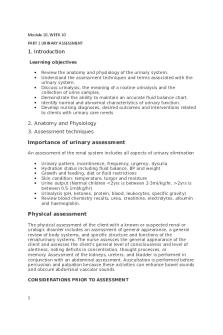Nguyen part 1 - Lecture notes 4 PDF

| Title | Nguyen part 1 - Lecture notes 4 |
|---|---|
| Author | Emily Valentine |
| Course | wHAT TO BELEIVE IN THE AGE OF THE INTERNET |
| Institution | Cardiff University |
| Pages | 1 |
| File Size | 44.8 KB |
| File Type | |
| Total Downloads | 22 |
| Total Views | 151 |
Summary
part 1 on Nguyen- echo chambers...
Description
Nguyen- Echo chambers Echo Chambers and Epistemic Bubbles
An echo chamber is a social epistemic structure from which other relevant voices have been actively excluded and discredited- as described by Nguyen An epistemic bubble is a social structure that isolates other relevant voices, it could be by a legitimate accident. People who are in epistemic bubbles often lack exposure to other views and important and relevant arguments/ information. On the other hand- echo chambers have been actively encouraged to distrust ALL outside information sources that disagree with their ways of thinking. The two main differences are that in echo chambers outside voices are consciously not let in, whereas with epistemic bubbles other voices are not heard, however this may be by pure accidence. It is important to emphasise these differences.
Echo Chambers brief explanation They can explain the post-truth phenomena. Echo chambers are far harder to escape than epistemic bubbles. Once in their grip an agent may act with epistemic virtue, however social context perverts those actions. Escaping an echo chamber will require a stark rebooting of one’s beliefs system. Epistemic bubbles It is a social epistemic structure which has inadequate coverage through a process of exclusion by omission. They leave out relevant epistemic sources, they do not discredit them actively. Two sources encourage this kind of attitude. 1) the epistemic agents’ tendency to seek like-minded sources of opinions. That is natural human nature. - ‘selective exposure’ as its often called by social scientists. This often occurs non-intentionally on sites such as Facebook or other social media sites. As humans we tend to like people who are like-minded as us and think like us. However, the above results in gaps in coverage and possibly a lack of the depth of knowledge being shown. 2) an epistemic agents’ informational breadth can be modified by other agents. E.g. censorship or media control by other states. ‘algorithmic personal filtering’ of online experiences. Internet searches can see what people are searching and use that to be able to filter a persons feed to suit their interests. Internet technologies create hyper-individualized, secret filters. Users do not know about the algorithmic filtering therefore it begs the question as to whether or not this is ethical or not. Many users do not know to what extent how much of their information is being used to censor their searches....
Similar Free PDFs

Nguyen part 1 - Lecture notes 4
- 1 Pages

Lecture Notes Part 1
- 8 Pages

Chap 8 part 1 - Lecture notes 4
- 4 Pages

+1 - Lecture notes 4
- 10 Pages

Lecture notes, lecture 1-4
- 9 Pages

Incs615 part 4 - Lecture notes 5,6,7
- 18 Pages

VAT-Notes-1-Part-1-4
- 18 Pages

Statistics Notes Part 4
- 6 Pages

Week 1 notes part B - lecture 1b
- 9 Pages

MGT 4893 Part 1 - Lecture notes 13
- 19 Pages

Part 2 new - Lecture notes 1
- 8 Pages

Medieval Literature Notes Part 1/4
- 14 Pages

CGT Study notes part 1 4
- 12 Pages
Popular Institutions
- Tinajero National High School - Annex
- Politeknik Caltex Riau
- Yokohama City University
- SGT University
- University of Al-Qadisiyah
- Divine Word College of Vigan
- Techniek College Rotterdam
- Universidade de Santiago
- Universiti Teknologi MARA Cawangan Johor Kampus Pasir Gudang
- Poltekkes Kemenkes Yogyakarta
- Baguio City National High School
- Colegio san marcos
- preparatoria uno
- Centro de Bachillerato Tecnológico Industrial y de Servicios No. 107
- Dalian Maritime University
- Quang Trung Secondary School
- Colegio Tecnológico en Informática
- Corporación Regional de Educación Superior
- Grupo CEDVA
- Dar Al Uloom University
- Centro de Estudios Preuniversitarios de la Universidad Nacional de Ingeniería
- 上智大学
- Aakash International School, Nuna Majara
- San Felipe Neri Catholic School
- Kang Chiao International School - New Taipei City
- Misamis Occidental National High School
- Institución Educativa Escuela Normal Juan Ladrilleros
- Kolehiyo ng Pantukan
- Batanes State College
- Instituto Continental
- Sekolah Menengah Kejuruan Kesehatan Kaltara (Tarakan)
- Colegio de La Inmaculada Concepcion - Cebu


